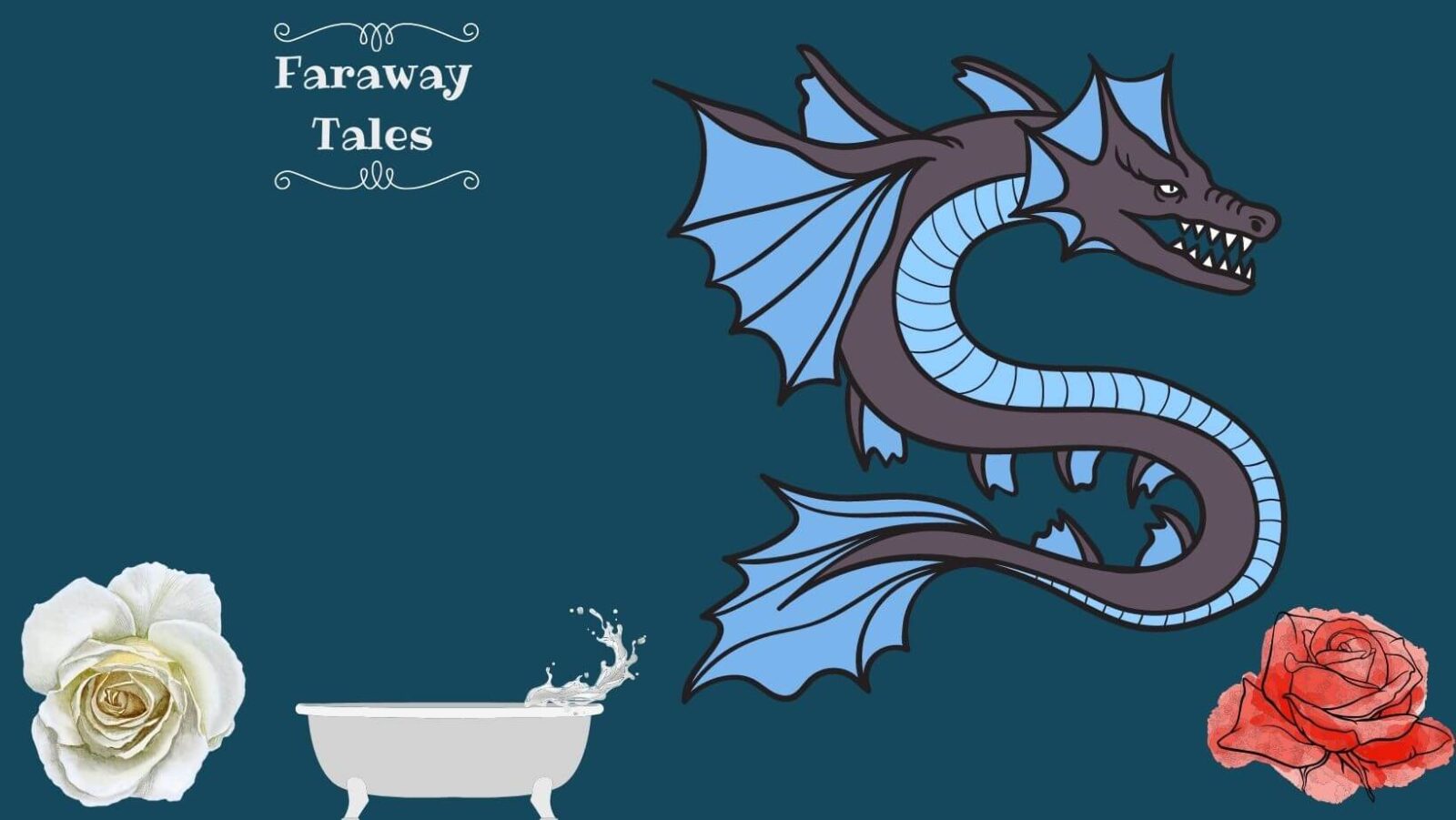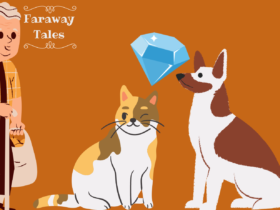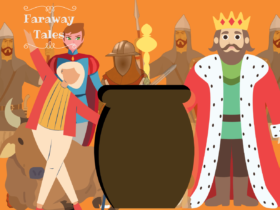|| A norse folklore ||
Once upon a time, there were a young king and queen. They had everything they could hope for, except children and that made them unhappy.
One day an old woman came begging for alms near the queen’s quarters. The queen gave her food and clothes.
The old woman thanked her and said, “I can help you get what your heart desires. Do exactly as I tell you. Listen. To-night, at sunset, take a little drinking-cup with two handles and put it bottom upwards on the ground in the north-west corner of your garden. Tomorrow morning at sunrise, and you will find two roses underneath it, one red and one white. If you eat the red rose, a little boy will be born to you: if you eat the white rose, it willl be a little girl. But, whatever you do, you mustn’t eat both the roses, that I warn you! Don’t forget!”
“Thank you a thousand times,” said the Queen, “this is good news indeed!” And she wanted to give the old woman her gold ring; but the old woman wouldn’t take it.
So the Queen went home and did as she had been told. Next morning, she went into the garden and lifted up the little drinking-cup. She was surprised, for indeed she had hardly expected to see anything. But there were the two roses underneath it, one red and one white. And now she was puzzled, for she did not know which to choose. “If I choose the red one,” she thought, “and I have a little boy, he may grow up and go to the wars and get killed. But if I choose the white one, and have a little girl, she will stay at home awhile with us, but later on she will get married and go away and leave us. So, whichever it is, we may be left with no child after all.”
However, at last she decided on the white rose, and she ate it.
And it tasted so sweet and delicious, that she took and ate the red one too: without ever remembering the old woman’s warning.
Some time after this, the Queen became the mother of twins. One was a lovely baby-boy, and the other was a Lindworm. (Lindworm is a mythical creature in Norse mythology, that looks like a giant snake and may sometimes have wings)
She was terribly frightened when she saw the Lindworm, but he wriggled away out of the room, and nobody seemed to have seen him but herself: so that she thought it must have been a dream.
The baby Prince was so beautiful and so healthy, the king and queen were full of joy. Not a word was said by anyone about the Lindworm: only the queen thought about it now and then.
Many years passed by, and the baby grew up into a handsome young Prince, and it was time that he got married. The King sent him off to visit foreign kingdoms, in the Royal coach, with six white horses, to look for a Princess grand enough to be his wife. But at the very first cross-roads, the way was stopped by an enormous Lindworm, enough to frighten the bravest.
He lay in the middle of the road with a great wide open mouth, and cried, “A bride for me before a bride for you!” Then the Prince made the coach turn round and try another road: but it was all no use. For, at the first cross-ways, there lay the Lindworm again, crying out, “A bride for me before a bride for you!”
So the Prince had to turn back home again to the Castle, and give up his visits to the foreign kingdoms. And his mother, the Queen, had to confess that what the Lindworm said was true. For he was really the eldest of her twins: and so he ought to have a wedding first.
So the King wrote to a distant country, and asked for a Princess to marry his son (but, of course, he didn’t say which son), and a Princess arrived. But she wasn’t allowed to see her bridegroom until he stood by her side in the great hall and was married to her, and then, of course, it was too late for her to say she wouldn’t have him. But next morning the Princess had disappeared. The Lindworm lay sleeping all alone: and it was quite plain that he had eaten her.
After few days, the Prince decided that he might now go journeying again in search of a Princess. And off he drove in the Royal chariot with the six white horses. But at the first cross-ways, there lay the Lindworm again, crying with his great wide open mouth, “A bride for me before a bride for you!”
Again, the king wrote to few kings in distant countries. At last, a princess arrived from a very distant land. She was also not allowed to see the groom until it was too late.
And by the next morning, she had disappeared too, eaten by prince lindworm.
The King was getting worried. He said, ” don’t know where to find a bride,” said the King, “I have already made enemies of two great Kings who sent their daughters here as brides. People are beginning to say strange things, and I am sure no Princess will dare to come.”
After a lot of thinking the king went to the royal shepherd, an old man with his only daughter. “Will you give me your daughter to marry my son, the Lindworm? And I will make you rich for the rest of your life.” “No, sire,” said the shepherd, “that I cannot do. She is my only child. I will be all alone” But the king wouldn’t take a refusal, so the shepherd had to give in.
His daughter was informed of her fate. She went out into the woods, crying loudly, bewailing her hard fate.
And while she wandered, she passed an old woman who asked her, “Don’t cry, pretty lass. Help me hunt some meat for dinner and maybe I can help you ”. “I don’t think anyone can help me, but I’ll help you all the same”, and the maiden caught a wild hare for the old woman.
The old woman, who was the same woman that helped the queen told her, “I can help you, lass. Listen carefully and do exactly as I tell you. After the marriage ceremony is over, you must ask to be dressed in ten snow-white dresses. And you must then ask for a tub full of lye,” (washing water prepared with wood-ashes) “and a tub full of fresh milk, and many whips. Have all these brought into your bed-chamber. Then, when the Lindworm tells you to shed a shift, you must ask him to slough a skin.
And when all his skins are off, you must dip the whips in the lye and whip him; next, you must wash him in the fresh milk; and, lastly, you must take him and hold him in your arms, if it’s only for one moment.” “The last is the worst—ugh!” said the shepherd’s daughter, and she shuddered at the thought of holding the cold, slimy, scaly Lindworm.
The shepherd’s daughter and prince lindworm were married the next day. When the feast was over, the bride asked for all the items as instructed by the old woman.
As soon as the door was shut, the horrible Lindworm turned to her and said, “Fair maiden, shed a skin!”. The shepherd’s daughter answered him, “Prince Lindworm, slough a skin!”. “No one has ever dared tell me to do that before!” said he. “But I command you to do it now!” said mustered bravely, despite being terrified.
Then he began to moan and wriggle: and in a few minutes a long snake-skin lay upon the floor beside him. The girl drew off her first dress, and spread it on top of the skin.
The Lindworm said again to her, “Fair maiden, shed a shift.” The shepherd’s daughter answered him, “Prince Lindworm, slough a skin.” The lindworm shed a skin and the bride removed the second dress.
And so this went on until nine Lindworm skins and nine white dresses were lying on the floor. And there was nothing left of the Lindworm but a huge thick mass, most horrible to see.
Then the girl seized the whips, dipped them in the lye, and whipped him as hard as ever she could. Next, she bathed him all over in the fresh milk. Lastly, even though she was purely disgusted, she dragged him on to the bed and put her arms round him.
Tired by the entire process, she fell asleep after sometime. Next morning she woke up and there was no Lindworm, but a very handsome prince next to her. The king, the queen and all the courtiers were shocked. “Whatever magic this was, the maiden succeeded in reversing the curse”, they all thought.
The wedding took place all over again, with festivals and banquets and merrymakings for days and weeks. No bride was ever so beloved by a King and Queen as this peasant from the shepherd’s cottage.
There was no end to their love and their kindness towards her: because, by her sense and her calmness and her courage, she had saved their son, Prince Lindworm.
Like (1)







It’s the Norwegian version of beauty and the beats 😂